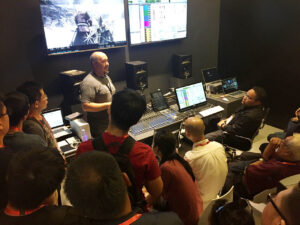
How important is Audio in Your Life?
Imagine that tomorrow is your big day: it’s your anniversary at work and you are expecting to receive a promotion! You definitely don’t want to be late for work, so you set your alarm 10 minutes earlier than usual… but you get up an hour late. The alarm went off, but made no sound. Not only you don’t hear when the postman rings the bell, but you don’t hear your toaster’s ring either… your breakfast is cold by the time you get to it. This morning you also miss an important call from your bank – your favorite ringtone is gone. Everything feels dead, as if the city stopped existing outside… eerie silence.
It gets even more eerie when you step outside and hear no birds, no traffic, no people.. and you notice that your hair is getting wet… hmm, it’s starting to rain. But there was no thunder to prepare you for it. You get into your car, double-check whether the door closed correctly, and start it up. Only a slight vibration tells you that the engine is running. You start driving and think about how you miss hearing the latest news on the radio, and how your mood used to be elevated by your favorite music – when your radio wasn’t silent yet. You realize that the tiny red indicator light on your dashboard has been on for miles – your seatbelt wasn’t fastened, but there was no beeping to warn you. You barely stop at the intersection, before a police car crosses in front of you; normally it would use its siren and also emit low-frequency audio to make you hear and feel its presence – but not today.
Finally you get to work. The morning has a strange atmosphere without hearing the receptionist’s voice (but seeing her smile), without hearing the music in the elevator and in the hallways… here, too, everything feels lifeless. You keep looking down at your shoes – are you wearing any? Your footsteps sound incredibly soft – as a matter of fact, you seem to be walking in complete silence.
After a couple of moderately productive meetings where no one talks, you start wondering: what else have I missed this morning? A few phone calls and voicemails? You see a missed text message: your friend tried to call you and talk about her strange ultrasound test that showed no organs in her body. Did you miss your online auction reminder, too? Maybe that company fire alarm at noon?
Your boss invites you into his office and you get the promotion. You even get a music download gift card – maybe it’s a joke? Your promotion is announced over email and your department is celebrating. They knew it was coming and they had prepared some confetti and party horns. Too bad your celebration has no soundtrack: no horns, no claps, no cheering. It feels quite unreal.
It’s late afternoon, time to leave. As you’re walking to your car and get almost hit by a non-electric, yet completely silent bus, you remember the dinner & movie date with your significant other. Shortly, you arrive to the restaurant. Wouldn’t it be nice to share the laughs and enjoy the romantic music of the place? Sorry, not today. You’re not even surprised when the waiter brings you a new fork… yes, it fell on the floor a few minutes ago, but you didn’t notice. You celebrate your promotion, but the cork doesn’t pop, the glasses don’t cling, and your cake’s chocolate cover doesn’t crack. Oh, well. Time for the movie.
You are smart so you choose a foreign film: it’s subtitled. Unfortunately it only takes a few minutes to realize how much you miss the sound effects: the movie just doesn’t feel real, rather quite flat: the car chase is boring, the magic box looks shiny but has no magic to it, the explosions are small and the slimy aliens seem surprisingly dry.
You miss the voices of the actors: even though you read their dialogue, you’re not sure how to interpret their lines without hearing the tonality of their voices. But what you miss the most is the music: the tear-jerkingly sad part is now disappointingly neutral, you don’t get scared from the killer who appears suddenly and the happy ending doesn’t make you feel good at all. The movie looks great but feels painfully boring.
Your drive home is as silent as the movie was. It’s only 10pm – how about some games before going to bed? Somehow the game is unexciting too. Who thought that all those weapon sounds and coin rewards were such important parts of the game? Not to mention the mute fire-breathing dragon that seems so much less dangerous today…
You are still thinking: what else did I miss today? Did my car alarm go off? Is my refrigerator still working? Why is my smoke detector flashing?
You go to sleep hoping that you will wake up the next morning to a working alarm clock and lots of sounds around you.

Importance of Sound in Audio and Media Production
In the audio- and media production fields we often say that “audio is an afterthought”. And this is not simply a pessimistic opinion, rather a statement based on the facts that most people are visual learners, visual observers and believe that the auditory experience is much less important than the visual experience. Few rely on their ears more than on their vision, and very few of us can imagine our lives without our eyesight.
When it comes to the position that professionals in the entertainment- and advertising industries take, even the majority of producers and directors (of television shows, movies, games, ads, etc.) place audio second or third, much after the narrative and the visual impulses that they prefer to focus on. As a matter of fact, most audio engineers, production sound mixers, recordists, post production mixers, sound designers and even composers are painfully familiar with the feeling of their work perceived as a supplement, a nice extra, but not a fundamental part of an audiovisual production… despite of the first half of the word “audiovisual”. Again, this is more than just a feeling; audio professionals often find themselves in situations where their production phase or resources are shortened, both the time and budget allocated for audio are reduced, only to be given to those working on the narrative and the visuals as an extension. Most of us can name a couple dozen of our favorite actors, actresses, maybe a dozen directors, but how many people can name just one sound designer who is responsible for the thousands of effects in a movie? Is it because their work is really not that important? Hardly so. Yet, in today’s fast-cut trailer-like consumer world of entertainment, advertising, communication and social interaction, audio is taken for granted, is often under-appreciated – it might even get completely omitted or muted by default.
Importance of Sound in Films and Movies
After Francis Ford Coppola promoted the importance of film sound in the late 1970s, music and sound design gained some recognition, however the attention was short-lived; digital technology soon enabled productions to cut down on the time allowed for audio post-production in most areas of the applied arts. Today, Coppola’s view on the soundtrack being responsible for fifty percent of the movie-watching experience seems like a romantic idea from the golden age of movie sound. In fact, the art form has changed very little since, but the way movies and other multi-media are produced and consumed has changed significantly.
An even more glaring example is the devolution of how we listen to recorded music. What used to be a sit-down, focused listening event at home for audiences around the world (a sort of home concert event), has turned into a light activity: often comprised of just hearing rather than actually listening to the music streaming to our phones on the train or on the street – using tiny ear buds at best.
Appreciation for the Power of the Sound
Audio needs a new wave of appreciation, an understanding of its importance, a renewed respect. What better way to realize how much we rely on audio in our daily life, how much we enjoy it but ignore its importance, than by imagining a day without it?
It’s the responsibility of sound designers, composers, media producers, audio post mixers, and especially the directors of tomorrow, to restore the balance in the way they target our senses. And, whether it’s in a documentary film or a movie, a virtual reality game or an augmented reality meeting platform, users and audiences will grow to appreciate a rich, refined audio experience.


